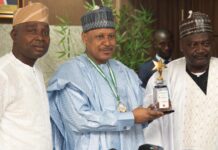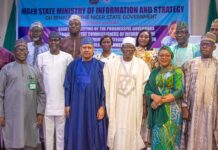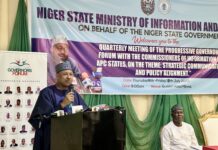PROTOCOL
Let me thank the organizers of AFRIMA for inviting me to speak at this auspicious gathering to promote, celebrate and elevate creativity in the area of music. This, to me, is one of the most important and credible platforms to promote African Music globally, using Nigeria as a pivot. My sincere hope is that you will do everything possible to sustain AFRIMA which, in your own words, is propelling African Music to the glorious pinnacle far beyond the borders of Africa.
2. I find the topic you have asked me to speak on, which is ”Championing Social Justice and Advocacy Through Music,” very interesting and absolutely relevant. For us in the business of communication, music is a powerful tool. One of the most interesting definitions of music, for me, is the one by Lou Rawls. It says ”Music
is the greatest communication in the world. Even if people don’t understand the language that you are singing in, they still know good music when they hear it.” end of quote. Leveraging that fact, the music of many artists around the world have crossed borders to become best sellers.
3. But there is also the issue of content or message if you like. Three days ago, I met with an iconic Nigerian, by the name Femi Esho, perhaps the number one custodian of music of yesteryear in Africa. He has a collection of 120 songs from 120 artists dating back to 1914!
During our interaction, Chief Esho harped on the need for music to have content, to have a message. And I agree with him, because the reason the music of such legends as Fela Anikulapo Kuti, Miriam Miriam Makeba, IK Dairo, Victor Uwaifo, Dan Maraya Jos, Mamman Shatta, Rex Lawson, Sonny Okosun etc, continues to reverberate is the timeless message they contained.
4. Talking about message, I did say at the meeting with Chief Esho that the federal government will leverage on the power of music to promote the National Re-orientation Campaign tagged “Change Begins With Me,” which was launched by President Muhammadu Buhari on Sept. 8th 2016. Because this campaign is about returning to those moral values that stood our country in good stead, a lot of that can be done through music. In order words, music is a powerful tool of advocacy. Good music has no tribe, no gender, no section, no religion.
5. I am sure many will remember that when Nigerian changed from right-hand driving to the left, the likes of Ebenezer Obey and Ayinla Omowura used their music to sensitize Nigerians. That was more effective than thousands of advertisement pages in the newspaper. Also, when Nigerian transited from Pound Sterling to Naira and Kobo, musicians played a prominent role on sensitizing the public.
6. In championing social justice or social reform, music is also a potent weapon.
– Who can forget Fela Anikulapo Kuti’s song’, “Unknown Soldier”, which drew attention to the injustice meted out to his mother, Olufunmilayo Ransome Kuti?
– Who can forget Ayinla Omowura’s song, “Owo Ile Eko”, in the 70’s that was a way of communicating to the government the need to help regulate the house rent during the time of Governor Mobolaji Johnson of Lagos State?
– Veno Marioghae’s song, “Nigeria Go Survive” in the 1980’s dwelt on the government’s inability to provide basic social amenities in the country
– Ebenezer Obey’s song, “Garri ti won”, in the 70’s reflected the effects of the austerity measures in place at the time
– Nelly Uchendu’s song, “Late Night Husband” , reflects on the irresponsibility of men who have turned their wives to bread winners and left with the upkeep of the home to them
– Ik Dairo, Jo Araba, EC Arinze all sang in the 60’s in memory of first Congolese Prime Minister Patrice Lumumba who was assassinated in 1961.
– Togo Lawson in 1920 sang “Won ti se wa jina”, a song that was then the favourite of Brazilian returnees who served as fieldworkers during the colonial period to protest irregular payment of their salaries.
– Akeeb Kareem sang ”NEPA” in the 70’s ( Never Expect Power Authority) where he recounted the sufferings of the people even when they paid their taxes.
– Sonny Okosun’s hit song, ”Fire in Soweto”, was one of the many he used to fight apartheid in South Africa.
In addition to social justice and advocacy, music is also a tool for social reform
– Zeal Onyia’s song “Ogogoro”, was composed in the 50’s to caution against excessive intake of alcohol.
– Adeolu Akinsanya’s song “Won fi Ibaje Sayo” was composed to advise women against the bleaching of their skin, very similar to Fela’s ”Yellow Fever”.
7. Music also chronicles history
– Godwin Omobuwa and Ebenezer Obey did a song, keep right, in 1972 when the country changed from driving on the left to driving on the right.
– Sonny Otti sang a song in memory of Nigeria’s first heavy weight champion, Hogan Bassey.
8. We can go on and on extolling the power of music.
9. When I consider the creative sectors of our economy like Music, Film, Production, the Arts etc, which by the way are all under the Ministry where I preside, I definitely subscribe wholeheartedly to achieving influence by building networks, communicating compelling narratives, and establishing international rules by drawing on the resources that make us unique – and Music sits on top of the list.
10. Research shows that the UK, for instance, draws much of its influence from its creative industries and in particular the dynamic performance of its music industry. The fact that five of the Top 10 best-selling albums in the world last year were by British artists highlights that music and culture are important not only for their economy and balance of trade, but in helping to promote a positive image of the UK both within and outside their country.
11. Also, America’s greatest and most positive attractive magnet is its music, movies, arts, images, and books, which are more popular than they have ever been. Indeed, if there is any group of Americans that are winning the hearts and minds of people all over the world, it isn’t military leaders, diplomats, business leaders, academics or politicians, whether Donald Trump or Hillary Clinton. It is the makers of America’s popular culture – The actors, the musicians and other celebrities.
12. I believe that Nigeria, in our pursuit of long lasting social and prosperous change, has a secret weapon in the arsenal of the powers in the creative industry.
13. The whole country is listening, dancing and sending via all forms of social media, our music and videos, and our artists clearly have more influence and reach than our law enforcement agencies. As 9ice and 2 Baba boasted, they are the ones with Street Credibility!
14. And of course, this works both ways and the government of President Muhammadu Buhari is committed to the prosperity of the sector. Nigeria must work for the Music industry, our great ambassadors and the entire sector. We are investing heavily in the creative sector in order to make their message richer, effective and
profitable.
15. In this regard, we have signed MoUs with the Tony Elumelu Foundation and the British Council, and we are also partnering with such credible organizations like AFRIMA to achieve our objectives of mass creation of jobs and development of skilled and managerial abilities; formalising and growing the export of all aspects of the
industry so that it becomes a significant foreign exchange earner for the country and also the provision of key infrastructure that will encourage local and foreign investments into all the key aspects of the Creative Industries.
16. In order to achieve these objectives, we will require the cooperation of all players in the sector. We hope we can always count on you.
17. I thank you all for listening





